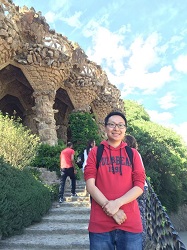- Speaker
- Prof. Yun-Long Xiao
- Institute of High Performance Computing (IHPC)
- Abstract
Heisenberg's uncertainty principle implies fundamental constraints on what properties of a quantum system can we simultaneously learn. However, it typically assumes that we probe these properties via measurements at a single point in time. In contrast, inferring causal dependencies in complex processes often requires interactive experimentation - multiple rounds of interventions where we adaptively probe the process with different inputs to observe how they affect outputs. Here we demonstrate universal uncertainty principles for general interactive measurements involving arbitrary rounds of interventions. As a case study, we show that they imply an uncertainty trade-off between measurements compatible with different causal dependencies.
- About the Speaker
Yunlong Xiao holds a Ph.D. in Mathematical Physics from the Max Planck Institute for Mathematics in the Sciences (MiS) in Leipzig, Germany, where he conducted his research under the guidance of Prof. Jürgen Jost and Prof. Naihuan Jing, successfully completing his degree in February 2017. He also obtained a second Ph.D. in Pure Mathematics from South China University of Technology, working under the supervision of Prof. Naihuan Jing, and graduated in June 2017. Following his academic pursuits, he served as a Postdoctoral Fellow at the Institute for Quantum Science and Technology at the University of Calgary, Canada, working alongside Prof. Barry C. Sanders and Prof. Gilad Gour until August 2019. Continuing his research career, he worked as a Research Fellow at the Quantum Hub in the School of Physical and Mathematical Sciences at Nanyang Technological University, Singapore, under the mentorship of Prof. Mile Gu. Currently, Yunlong holds the position of Senior Scientist at the Institute of High Performance Computing (IHPC), The Agency for Science, Technology, and Research (A*STAR). His pursuits converge on quantum foundations, quantum causal inference, quantum resource theory, and quantum communication, and his contributions have found a home in journals such as Phys. Rev. Lett, Phys. Rev. Research, Phys. Rev. D, npj Quantum Information, New J. Phys. His influence extends beyond publications, as evidenced by his contributed talks at conferences including APS March Meeting, AQIS, QPL, and QIP.
- Date&Time
- 2024-10-23 2:00 PM
- Location
- Room: A403 Meeting Room




